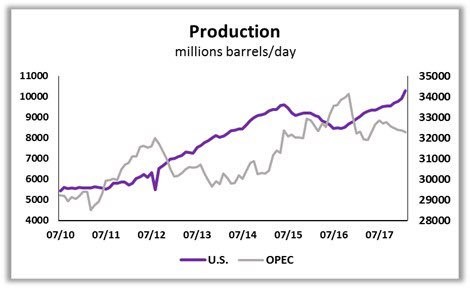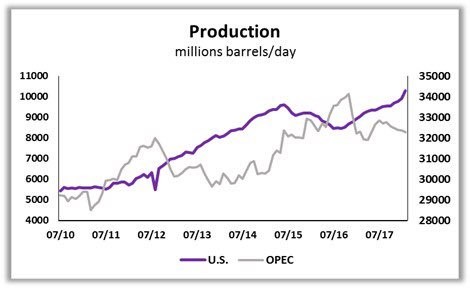
We previously reviewed the oil market in U.S. Shale vs. OPEC Oil Price War: Who Will Win?. American production of oil accelerated from 2012 to 2014 as non-conventional oil and gas drilling in shale led to a revolution in production known as fracking. The fracking revolution didn’t affect the marketplace until late 2014 when the price of oil collapsed due to a supply glut. As you can see in the chart below, this big price correction changed the game for the oil market. Previously, OPEC cartel had controlled the market for years up until this point.

Source: the chart below
This situation utilizes game theory because OPEC makes decisions which affect countless other players. It’s not like a normal market where supply and demand are the only factors. OPEC can either decide to raise production which lowers the price or cut production which increases the price. Both choices have clear positives and negatives for OPEC nations. High production means more volume is sold, but the price is lower. Production cuts mean lower supply, but higher prices. Low prices help demand and high prices hurt demand, but these factors are a bit limited in this scenario because the supply changes were what altered the price.
The interesting factor in play was how the choices would affect American frackers. Many highly indebted frackers went bust during this correction. The energy firms dominate the junk bond market as we’ll discuss later. OPEC could have accelerated its production to keep prices down to crush the frackers. That would allow OPEC to maintain market share as its competitors would be weakened. The hope for OPEC would be once prices rebounded, the frackers wouldn’t be there to produce oil.
However, OPEC didn’t choose that route. Instead, it cut production with the goal of getting the supply glut down. As of spring 2018, the supply glut is worked through which is why oil prices rallied to the high $60s in WTI terms. OPEC didn’t crush American frackers. This price crash was arguably a great thing for US production because during the downturn firms lowered their drilling costs. The temporary decline made the firms stronger. This is why US production is now higher than ever before. OPEC is profiting in the short term by selling oil at higher prices, but they lost market share.
















